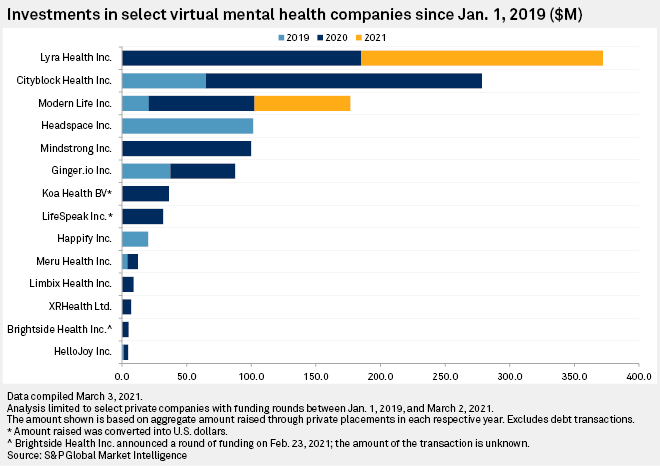S&P Global Offerings
Featured Topics
Featured Products
Events
S&P Global Offerings
Featured Topics
Featured Products
Events
S&P Global Offerings
Featured Topics
Featured Products
Events
Banking & Capital Markets
Economy & Finance
Energy Transition & Sustainability
Technology & Innovation
Podcasts & Newsletters
Banking & Capital Markets
Economy & Finance
Energy Transition & Sustainability
Technology & Innovation
Podcasts & Newsletters
S&P Global Offerings
Featured Topics
Featured Products
Events
8 Mar, 2021
By Morgan Frey and Jason Woleben
Following a year of social distancing, lockdowns and job losses, 41.1% of U.S. adults reported symptoms of anxiety disorder or depression in January 2021, according to the National Center for Health Statistics and the U.S. Census Bureau's Household Pulse Survey.
These growing concerns have opened up a path for digital health companies with mental health platforms to raise capital and expand their customer base by offering services for employers to use for their workforces.
Over the past two years, investors have channeled millions of dollars into platforms that offer mental health and behavioral care services. Following the onset of COVID-19, firms ramped up their investments, leading to Lyra Health Inc.'s $187 million series E funding round and Modern Life Inc.'s $74 million round in January 2021 — the same month that another mental health company, Talkspace Network LLC, announced it would merge with blank-check company Hudson Executive Investment Corp. to form a combined entity worth about $1.4 billion.

The case for employers to take mental health seriously has never been clearer. A 2016 study led by the World Health Organization found that while depression and anxiety disorders cost the global economy $1 trillion each year, every $1 spent on expanding treatment for anxiety and depression leads to a return of about $4 through people's improved health and ability to work.
In fact, many employers were already scaling up mental health offerings as part of their employee health plans, and the pandemic has only accelerated this trend. In a survey conducted in the summer of 2020 by the non-profit organization Business Group on Health, 69% of large employers said they already offered virtual mental health services to employees, with 88% expecting to provide them in 2021.
This has led mental health apps and platforms to set themselves apart in an increasingly crowded market.
Lyra, which provides a variety of mental health solutions from video coaching to therapy and prescription services, states it can offer a 4x return on investment, or ROI, for employers, with services leading to a 27% decrease in institutional claims, a 20% fall in health plan therapy and prescription claims, and a 50% reduction in employee turnover rate.
According to Ginger.io Inc., which works with employers and health plans to provide mental health services, the platform has a 4.2x ROI based on peer-reviewed utilization and outcomes data published in the Journal for Medical and Internet Research. The observational study found that 70% of Ginger users saw an improvement in depression symptoms within 10-14 weeks of use, while a study published in January demonstrated that about 60% of members who received behavioral health coaching and clinical telemental health services reporting a decrease in their anxiety.
A licensed medical provider, Ginger assigns a behavioral health coach and, if needed, a therapist or psychiatrist, to an individual, who will work together to form the best treatment plan for an employee.
"I think what's really interesting about Ginger's approach is how the model backs it up. Conceptually, that 4.2x means we're saving both our clients and members cost by fundamentally making sure they get care earlier, because our unique model just allows them to come in and reduces all the barriers to access care," Nicola Kamath, Ginger's vice president of product marketing, told S&P Global Market Intelligence.
Overcoming stigma
|
|
Along with traditional barriers to care access like cost, the stigma surrounding mental health can be another obstacle.
Patrick Burke, head of healthcare at mental health company Happify Inc., said one of their goals is supporting employers to destigmatize conditions by making employees feel comfortable to talk about the issues they are facing.
"In a universe of 100 people, only ... 30 of them are going to raise their hand and 70 are not. And that ratio is consistent almost no matter what the population size," Burke said.
Employers, health plans and pharmaceutical companies that have signed up to the Happify platform can offer their employees or users a range of services from the company's mobile app and platform, such as Ember, which helps employees manage stress and burnout, and Moment, which teaches employees how to practice mindfulness. Through the Happify Activate offering, the company also uses its knowledge of consumer behavior and communication tools to inform a customer's employees about the benefits of seeking mental health care.
"How do we really use this moment to reduce stigma so folks can start thinking about their mental health in this time of need and making that available to everyone?" says Ginger's Kamath, who adds that accessing these employer-provided services can have a knock-on positive impact for employees feeling trapped by the pandemic.
"Once they try it, [our services] help shape their perspective of ... 'In this world of COVID, where we can't control so much around us, this feels like something that I can affect.'"
